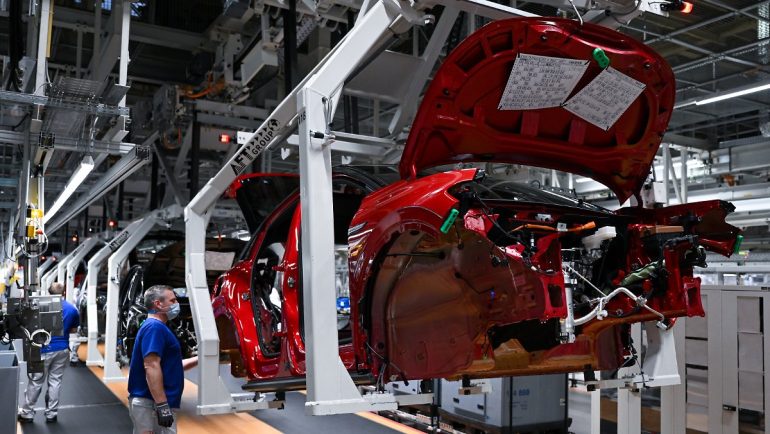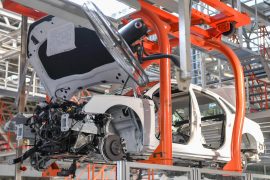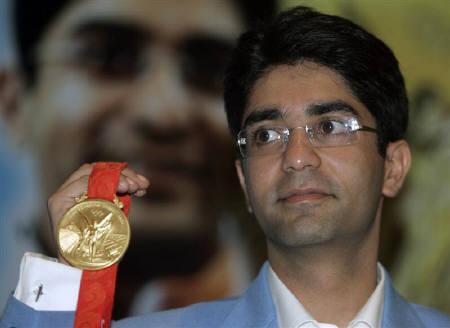Supervisors gave green signal
VW competes with Tesla with its Trinity plant
3/4/2022 9:23 PM
While Tesla is officially allowed to roll off the assembly line in Grunheide as of today, Wolfsburg is following suit. Volkswagen decides to build a production site specifically for the future electric flagship Trinity. The group has high hopes from the multi-billion-euro project.
The Volkswagen Supervisory Board has finally commenced construction of a new plant in Wolfsburg for future central Trinity electric models. The group is spending a good two billion euros on the factory, and work is scheduled to begin in the spring of 2023. As already indicated in the first decision-making round, a completely redesigned production site will be built in the immediate vicinity of the headquarters: on the north side of the previous site in the Warmnau district of Wolfsburg.
“In this way we are continuously strengthening the competitiveness of the core plant and giving employees strong long-term prospects,” said core brand boss Ralf Brandstetter after consulting with the control committee. Trinity production is scheduled to begin in 2026. At the same time, the main plant would be opened up to other electric and combustion cars and would later be radically transformed. With the Trinity factory located next door, Volkswagen is looking to catch up with its US competitor Tesla in terms of production technology, among other things. But it should also be a model for the transformation of many of our own places.
Americans also got approval today for their own new plant in Grunheide near Berlin – Only 200 kilometers from Volkswagen Headquarters and almost two years after construction began, with only preliminary approvals. Like Tesla, VW targets a production time of ten hours per car for the Trinity at its “Giga factories.”
systems for autonomous driving
All-electric models should have the company’s own software and have lots of networking technology, even with systems for autonomous driving. Trinity is being developed on a new high-volume platform called SSP. During its lifetime, it is intended to form the basis for a total of more than 40 million vehicles from the VW Group.
For Daniela Cavallo, head of the Works Council, the decision is an important stage in the restructuring of the headquarters – recently the chip crisis at Volkswagen sparked heated debate about the low capacity and the late introduction of the e-model in Wolfsburg. Before Trinity, the house location should receive part of the production of the electric compact car ID.3 from 2023. Within Europe, it was first produced in Zwickau, Saxony.
“Our company’s roots remain the powerhouse of the group and continue to grow in importance,” said Cavallo. She previously said: “We need the project above all to drive change, that is, to continue to provide work for the employees we now have.”
Lower Saxony’s prime minister and VW supervisor Stephan Weil said the carmaker’s entire production in his state should become CO2-neutral in several phases. With the decision to build a second factory in Wolfsburg, the group also wants to ensure that new projects are more closely linked. “The great advantage of this solution lies in its efficiency,” said Human Resources Director Gunnar Killian. “That way, we don’t burden us with starting production of new cars at the main plant with extensive conversion work and at the same time converting it to the new factory model.”
“Campus Sandcamp” aims to strengthen networking
Trinity also plays a key role in the restructuring of vehicle development. At the new developer headquarters “Campus Sandcamp”, which cost 800 million euros and construction is expected to begin in 2022, responsible board member Thomas Ulbricht wants to network processes more closely with the work of IT specialists and other departments . According to Cavallo, it was also discussed with management that “we are expanding the area of battery, charging and digitization around Trinity here in Wolfsburg.
There is already a capacity center in Salzgitter, and a battery cell factory will be added there. Further European SAIL plants are being planned, according to VW, locations other than Skelefte in Sweden have yet to be officially determined and are in talks with politicians due to economic conditions. In theory, the VW supervisory board had already approved Trinity plans for late 2021 – the exact construction site was still open.
VW completed just a little less than 400,000 cars in Wolfsburg last year, a lack of chips mainly due to fewer than they have been in since the late 1950s. With regard to environmental regulations, the group announced that it would “closely exchange information with responsible authorities and interest groups”.

Reader. Organizer. General creator. Zombie fanatic. Alcohol advocate. Food junkie. Bacon ninja.





